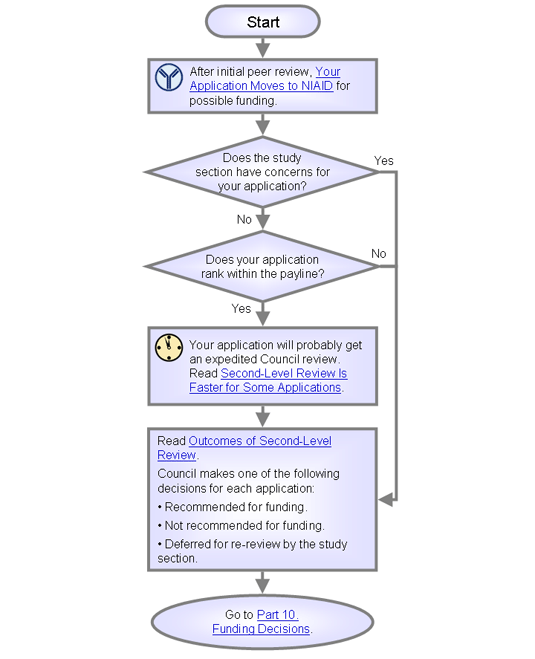|

Table of Contents
Are You Ready for This Part?
Part 9. Second-Level Review describes how NIAID's advisory Council recommends applications for funding.
Before reading this page, be sure that you . . .
Your Application Moves to NIAID
After initial peer review, your application moves from CSR (for applications reviewed there) to NIAID for possible funding.
At that point, your contact person becomes the Institute program officer assigned to your application. His or her name is listed in your summary statement together with that of your grants management specialist. Contact your program officer after you receive your summary statement.
Find more information online:
Second-Level Review Is a Smaller Hurdle
| Our Council looks at administrative issues and applications that may receive special funding. |
|
Your biggest hurdle is initial peer review. Once you've cleared that, the second-level review is a small step, which ensures there are no administrative problems.
Most applications sail through second-level review without heavy scrutiny.
Nature of Second-Level Review
- By law, NIAID's main advisory Council must recommend an application before we can fund it.
- Second-level review is not a second scientific review.
- Rather, it looks at applications with potential barriers to funding such as human subjects and animal concerns or special circumstances such as foreign applications and renewal applications requesting more money than the limit.
- We describe what to do about bars to award at Know What a Summary Statement Means and Bars to Grant Awards SOP.
- Generally, our main advisory Council will not recommend your application for funding until you resolve the study section's concerns.
- This usually means you must send us more information.
- Contact your program officer quickly if you see problematic animal or human codes on your summary statement.
Find more information online:
 |
Did the study section have concerns for your application?
|
 |
Does your application rank within the payline?
|
Second-Level Review Is Faster for Some Applications
| NIAID uses expedited review for applications that meet the criteria. |
|
About eight weeks before each Council meeting, a subset of members gives an electronic expedited review to some applications.
Only three people perform the actual expedited review; then, the full Council ratifies the results at the live meeting.
- We use expedited review for applications that meet both of the following criteria:
- Rank within its payline.
- Have no concerns (e.g., human or animal codes) from the study section.
- Expedited review lets us make awards several months earlier than would otherwise be possible.
- For the first two Councils -- January or February and April or May -- we can fund grants a few weeks after the initial peer review meeting.
- Because September Council reviews applications for funding in the next fiscal year, those applicants may have to wait to get their awards after the Institute receives its next year's appropriation.
- The remaining applications have a regular second-level review at the Council meeting. NIAID makes those awards a few weeks after the meeting.
Any Council member participating in an expedited review may request that an application be reviewed by the full Council.
Outcomes of Second-Level Review
| Council recommends an application for funding. NIAID makes the final decision. |
|
Whether the review was expedited or not, Council makes one of the following decisions for each application:
- Recommended for funding.
- Not recommended for funding.
- Deferred for re-review by the study section.
When Council recommends an application for funding, that doesn't necessarily mean it will receive an award. NIAID makes the final decision.
We may not fund your application because administrative issues need to be resolved. If your application scores beyond the payline, it may be deferred for a later funding decision, usually at the end of the fiscal year.
Program staff send you a letter six to eight weeks after the advisory Council meeting stating whether we will fund your application. More complex grant types may take longer. Talk to your program officer for advice.
Through selective
pay and R56-Bridge
awards, we fund some programmatically important
R01 applications whose scores missed
the payline, with Council approval. If you want details on these programs now, read more at NIAID
May Approve Special Funding.
Help us improve our outreach to you by emailing deaweb@niaid.nih.gov.
|